Trump’s Embrace of Fascism Is America’s Dirty Little Secret
Rather than dismissing it as a wild card in American politics, it is crucial to recognize that Trump’s popularity represents what one writer calls a dangerous “political space … in both the wider culture and in recent history.”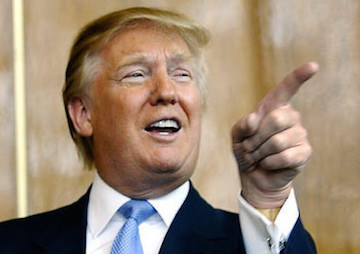 Donald Trump. (Ninian Reid / CC BY 2.0)
1
2
Donald Trump. (Ninian Reid / CC BY 2.0)
1
2

Donald Trump. (Ninian Reid / CC BY 2.0)
In the earliest years of the Third Reich, various central, regional, and local authorities in Germany established concentration camps to detain political opponents of the regime, including German Communists, Socialists, trade unionists, and others from left and liberal political circles. In the spring of 1933, the SS established Dachau concentration camp, which came to serve as a model for an expanding and centralized concentration camp system under SS management.What is truly sad, dangerous, and even cowardly is how few people along with the corporate media and his intellectual defenders recognize that Trump is symptomatic of the brutal seeds of totalitarianism now being cultivated in American society. Donald Trump represents more than the anti-democratic practices and antics of Joe McCarthy. On the contrary, he signifies how totalitarianism can mutate and take different forms in specific historical moments. Rather than being dismissed as a wild-card in American politics, it is crucial to recognize that Trump’s popularity represents what one writer calls a dangerous “political space … in both the wider culture and in recent history.” This is evident not only in his race baiting, but in his increasing support for violence against protesters at his rallies, and his call to “make American great again” by any means necessary, none of which is new to American society. What is new is the degree to which this endorsement of violence, racism, and the call to violate civil liberties are expressed so visibly and without apology. How else to explain the muted criticisms, if not almost non-existent public and media response, to his comments that: “we’re going to have to do things that we never did before. And some people are going to be upset about it, but I think that now everybody is feeling that security is going to rule… And so we’re going to have to do certain things that were frankly unthinkable a year ago…” This call to do “the unthinkable” is a fundamental principle of any notion of totalitarianism, regardless of the form it takes. Trump merges a hyper-nationalism, racism, and bigotry with a flagrant sense of lawlessness. His hate-filled speech is matched by his endorsement of violence against immigrants and other oppositional voices issued by his supporters at many of his rallies. This type of lawlessness does more than encourage hate and the muting of dissent; it also legitimates the kind of inflammatory rhetoric that gives credibility to acts of violence against others. There has been an eerie silence by Trump and other Republican Party presidential candidates in the face of the killing of three people at a Planned Parenthood clinic in Colorado, white supremacists shooting at Black Lives Matter protesters in Minneapolis, the increasing attacks on Mosques throughout the United States, and the alarming number of shootings of Black men and youth by white police officers. There are historical precedents for this type of violence and the hate-filled speech by politicians who create the climate that legitimates it. We heard it in the words of Hitler, Mussolini, Pinochet, and other demagogic orators, ranting in a tone of neurotic hysteria against Jews, communists, and others alleged “infidels.” Trump’s recent call to bring back waterboarding and to support a torture regime far exceeds what might be called an act of stupidity or ignorance. Torture in this instance becomes a means of exacting revenge on those considered “Other,” un-American, and inferior—principally Muslims, immigrants, and members of the Black Lives Matter Movement. We have heard this discourse before in the totalitarian regimes of the 1930s and later in the dictatorships in Latin America in the 1970s. Heather Digby Parton is right when she writes that Donald Trump “may be the first openly fascistic frontrunner for the Republican presidential nomination but the ground was prepared and the seeds of his success sowed over the course of many years. We’ve had fascism flowing through the American political bloodstream for quite some time.” This is a discourse that betrays dark and dangerous secrets not simply about Trump, but more importantly about the state of American culture and politics. Trump’s brutal racism, cruelty, and Nazi-style policy recommendations are more than shocking, they are emblematic of totalitarianism’s hatred of liberalism, its call for racial purity, its mythic celebration of nationalism, its embrace of violence, its disdain for weakness, and its anti-intellectualism. This is the discourse of total terror. These elements of totalitarianism have become the new American normal. The conditions that produced the torture chambers, intolerable violence, extermination camps, squelching of dissent are still with us. Totalitarianism is not simply a relic of the past. It lives on in new forms and it is just as terrifying and dangerous today as it was in the past. Mark Summer is right in arguing that the ghost of fascism runs through American society indicating that it never went away and that the threat of fascism has to be taken seriously. He writes that fascism didn’t win on the battlefield, but it won ideologically.
It won because the same fears, the same greed, the same hatred that fueled its growth in the first part of the twentieth century never went away. The symbols of fascism became anathema, but the causes … went deep. And gradually, slowly, one step at a time, all those vices became first tolerated, then treated as virtues, and then as the only acceptable view… [For instance] our long, stumbling lurch to the right; the building force of corporate power; the relentless need for war; a police whose power of enforcement is divorced from law; a preening nationalism that rewards the full rights of citizenship only to those who fit an ever-narrower mold… I’m not saying we’re moving toward fascism. I’m saying we started that drift a long time ago, and now we’re well across the line.Your support matters…
Independent journalism is under threat and overshadowed by heavily funded mainstream media.
You can help level the playing field. Become a member.
Your tax-deductible contribution keeps us digging beneath the headlines to give you thought-provoking, investigative reporting and analysis that unearths what's really happening- without compromise.
Give today to support our courageous, independent journalists.

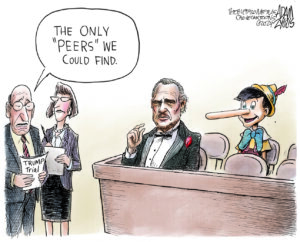

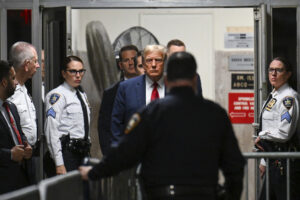
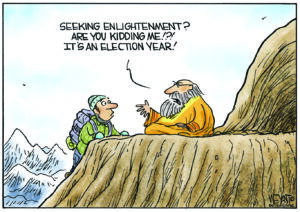
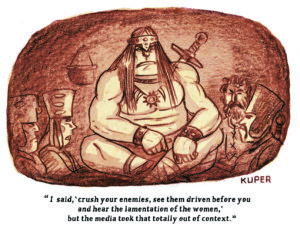
You need to be a supporter to comment.
There are currently no responses to this article.
Be the first to respond.